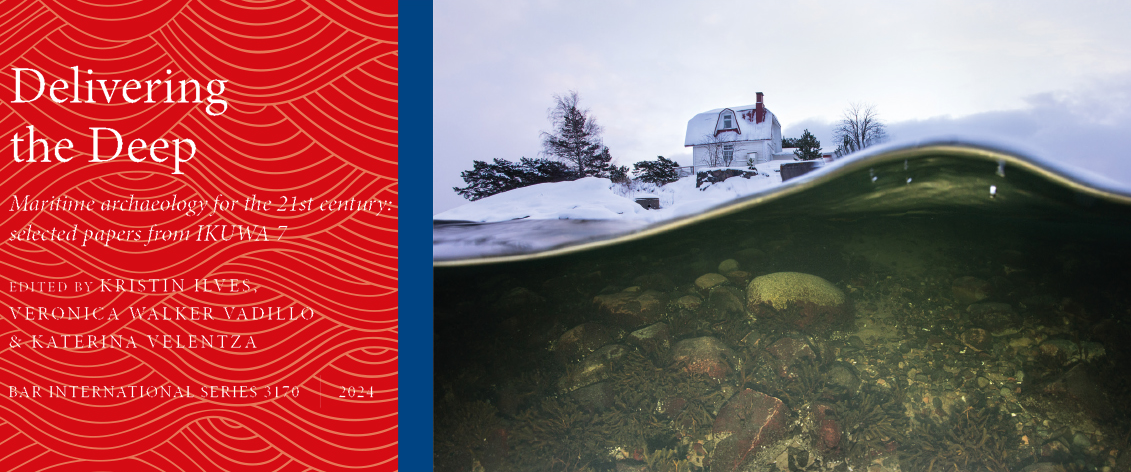Foreword
This peer-reviewed edited volume is based on research presented at the 7th International Congress for Underwater Archaeology (IKUWA 7), which was organised by the University of Helsinki, the Finnish Maritime Archaeological Society and the Finnish Heritage Agency and took place 6–9 June 2022 in Helsinki, Finland. This was the first time an IKUWA conference had been planned to convene in one of the Nordic countries, and it had to be postponed twice from its original date of June 2020 due to the COVID-19 pandemic. Only after most of the obstacles of the pandemic had been overcome were around 250 maritime archaeologists from different continents and countries able to meet in June 2022 in Helsinki to participate in the seventh IKUWA-series conference.
The theme of IKUWA 7 was Delivering the Deep— Visions for the Future of Maritime Archaeology. This thematic choice envisioned a productive amalgamation of underwater and maritime cultural heritage studies with research on the challenges the world faces at present, including climate change, erosion threats, water pollution, mismanagement and other types of human-related activities that make the future of maritime archaeology and the conservation of maritime resources uncertain. Overall, the theme urged participants to engage in discussions about the potential for our field to help shape a more promising future for all members of society.
The scientific program consisted of three days and nearly 130 presentations, along with a two-day poster session. The presentations explored maritime perspectives on topics such as climate change, trade, inland waterways, lake and wetland dwelling, war, material reuse and ritualistic and cognitive signs, as well as maritime cultural landscapes. Additionally, maritime cultural heritage was examined as an integral part of ‘Blue Growth’ and marine science, for generating new knowledge on historical use of marine resources and human relationship with the sea. Subsequently, maritime archaeological research was signified as extremely relevant on an international scale at present, particularly because the United Nations recently proclaimed the 2021–2030 period as the Decade of Ocean Science for Sustainable Development. This edited volume embodies that relevance by displaying the diversity of research topics and approaches as presented during the conference and highlighting the versatility of our field and its relevance to the wider field of archaeology and heritage studies.
Besides the scientific program, one of the objectives of IKUWA 7 was to accentuate the importance of the United Nations Educational, Scientific and Cultural Organization (UNESCO) 2001 Convention for the Protection of Underwater Cultural Heritage (CPUCH), which Finland has not yet ratified. A panel discussion organized by the UNESCO CPUCH Secretariat at the beginning of the conference highlighted the responsibility for protecting and researching maritime heritage beyond national borders. The Baltic Sea region, with its unique preservation of shipwrecks from various time periods and origins, and our small group of experts dedicated to their protection and research, present an opportunity to utilise international agreements such as the UNESCO 2001 Convention for preserving a rich heritage which largely lies on the seabed hidden from view. A glimpse into the remarkable underwater heritage of Finland was provided to all conference speakers through Pekka Tuuri’s book Vedenalainen Suomi [The underwater world of Finland], which was gifted to them as a memento of their visit and a thanks for their contributions.
IKUWA 7 was made possible thanks to the infrastructure set up between the Maritime Archaeological Society of Finland, the Finnish Heritage Agency and the University of Helsinki. The conference received vital financial support from the Federation of Finnish Learned Societies, the Weisell Foundation and the Finnish Cultural Foundation. The University of Helsinki provided the conference facilities, while the Finnish Heritage Agency and the University of Helsinki also contributed through their staff’s working hours. The volunteer support from student assistants and members of the Finnish Maritime Archaeological Society also contributed significantly to the success of IKUWA 7, and we are very grateful to them. Our most sincere thanks also go to our colleagues in the IKUWA Steering Committee, who were always ready to assist and advise us in the challenges we encountered.
In any conference, the opportunity for networking and getting together with colleagues is crucial. On this point, the feedback from the conference has been overwhelmingly appreciative. As we say in Finland, ‘guests make the party,’ and we believe this holds true for scientific conferences as well. We extend our most heartfelt gratitude to all the participants of the conference for the unforgettable encounters. We look forwards to seeing everyone again at the upcoming IKUWA 8 in Belgium!
On behalf of the organizing committee,
Kalle Virtanen, Chair of the committee and Minna Koivikko, Vice-chair of the committee















